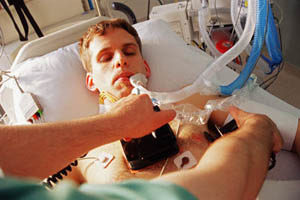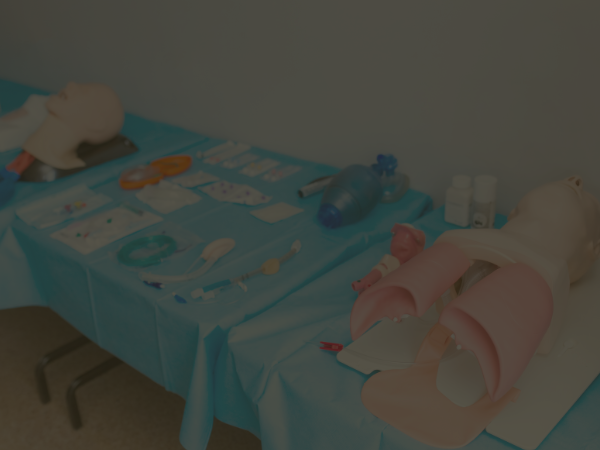Your cart is currently empty!
Do I Really Need ACLS Training: Impact On Your Career
Health care professionals that complete ACLS training holds many more career opportunities that go beyond working in the hospital setting or emergency centers. Their skills are valuable across multiple industries where the risk for encountering someone in cardiac arrest is higher. However, any situation can turn into an emergency. In fact, consider these top career settings where employing an ACLS provider, those with cardiac care training, such as a BLS or ACLS Certification, may be required.
Schools Want ACLS Training Among Nurses and Applicable Professionals

Working in a school, including elementary, high schools and institutions of higher learning, is another area where health care professionals may work and need an ACLS Certification. Recent years have revealed schools across the country embracing the idea of on-site automated external defibrillators (AEDs) and mandated training for school employees. According to AED Brands, all states possess some type of law requiring the placement of AEDs in both schools and public places.
While defibrillators provide a life-saving shock to those in cardiac arrest, an AED is only one-half of the process. The remainder exists as CPR and ACLS, and since school employees may not necessarily be trained medical professionals, the majority may need to obtain their CPR and BLS Certification. Meanwhile, school employees with a medical background may need to complete an ACLS training course for employment, including:
- School nurses. School nurses are a vital part of any successful school. They see students with an array of health conditions, and they are among the first responders when a student collapses or otherwise experiences a medical emergency. Therefore, they need to know how to properly respond with the full ACLS repertoire of skills. In colleges and universities, a school clinic may exist that employs multiple health care professionals capable of responding to emergencies as well.
- Athletic trainers. Athletic trainers in schools also serve in a medical capacity during school sporting events and functions.
- Vocational courses. Instructors of health care vocational courses may also need to complete an ACLS course for employment, falling under requirements of partnering health care facilities where students complete clinical rotations.
Sporting Arenas and Gyms May See a Higher Risk of Cardiac Arrest
 The prevalence of sudden death in adolescents and young adults is exceedingly rare, and research from the Mayo Clinic indicates no known cause of arrest is easily identifiable. Thus, researchers attribute most sudden cardiac arrest deaths in today’s youth to undiagnosed, congenital heart defects. The beginning of the problem arises when the heart enters an arrhythmia, such as ventricular fibrillation or tachycardia. Most cases of sudden cardiac arrest also occur when the person engages in high-intensity exercise or exertion.
The prevalence of sudden death in adolescents and young adults is exceedingly rare, and research from the Mayo Clinic indicates no known cause of arrest is easily identifiable. Thus, researchers attribute most sudden cardiac arrest deaths in today’s youth to undiagnosed, congenital heart defects. The beginning of the problem arises when the heart enters an arrhythmia, such as ventricular fibrillation or tachycardia. Most cases of sudden cardiac arrest also occur when the person engages in high-intensity exercise or exertion.
Sporting arenas include all areas where youth and young adults participate in high-intensity exercise. As a result, exercise gyms and public sporting venues may require employees to possess advanced cardiac care skills. ACLS may be required among employees working at the facility in a medical capacity, such as an athletic trainer or team physician.
Recreational Venues Benefit From On-Site ACLS-Trained Staff
Recreational venues, excluding sporting venues, are another area where obtaining advanced training may be necessary. Although most of these facilities serve the public, they may employ health care professionals with ACLS experience and skills. If not, non-medical employees should also consider completing a First Aid and BLS program to ensure proper use of First Aid supplies and AEDs. Some venues that may require on-site medical professionals include:
- Theaters. Both movie and live-performance theaters may require medical professionals to ensure the safety of building occupants, especially those working with large equipment and performing potentially dangerous stunts. Such activities are more likely in live-performance theaters. However, the value of employing at least one trained individual is everything to someone suffering from cardiac or respiratory arrest.
- Other event venues, such as wedding and party venues. Wedding venues that employ an on-site health care professional may seem unusual, but history teaches a different lesson. Take this into consideration; weddings are extremely stressful events. The pressure for the perfect event can lead people to hold off on eating and drinking enough water. The risk for heat exhaustion increases, and in fact, people have fainted from suffering sudden cardiac arrest during the big event. According to the National Library of Medicine (NLM), a 2012 study of major life events as triggers for cardiac arrest revealed a 1.6-times higher risk of cardiac arrest during or within the month following a major life event, such as getting married. In addition, multiple stories exist that detail the experiences of people jumping into action when someone at the wedding slips into cardiac arrest.
Seasonal Attractions and Theme Parks May Require Advanced Training Among Staff
Summer is a time of excitement and fun times across theme parks and seasonal attractions. Unfortunately, seasonal attractions can also be a source of distress, including:
- Drowning risk. Water parks may present a drowning risk for those who cannot swim. In fact, approximately 10 people die daily from unintentional drowning, reports CDC.gov, and the excitement of visiting a water park often overshadows the potential risk.
- Personal injury. Theme parks may also increase the risk of injury. For example, those visiting zoos may be injured by an animal, a fall may occur, or another event could turn a joyous day into a nightmare. In severe cases, a person may enter cardiac arrest, requiring care to survive.
- Motion sickness and dizziness. Another risk factor in seasonal attractions and theme parks involves the danger resulting from motion sickness and dizziness. Both can occur following a thrill ride or as a symptom of heat exhaustion. For those with medical problems, a simple dizzy spell can turn deadly.
EMS and Flight for Life Require ACLS Certification
Emergency medical services (EMS) providers and those working in air-flight medical transport also need to complete an ACLS training course. The basic goal of EMS is to provide immediate care and respond to traumas outside of a typical care environment. As a result, they are more likely to encounter those entering unexplained or trauma-related cardiac arrest. Any delay in providing immediate care, including failure to properly follow the respective algorithms and treat reversible causes of arrest, increase the risk for mortality, so completing advanced training can decrease mortality risk. Any first responder with a background in health care may also complete such courses to improve their skills.
For example, firefighters and police officers responding to fires and other emergencies, especially those holding an EMS Certification, may also need to complete ACLS training.
Those With ACLS Training May Volunteer Abroad
Volunteering abroad opens the door to ample opportunities for helping the poor, sick, and in need. Knowing to respond to someone in cardiac arrest remains a topic of grave concern in low-resource countries and regions. According to NCBI.NLM.NIH.gov, a case study of cardiac arrest abroad found significant decreases in survival following cardiac arrest in low-resource countries due to failure to recognize its symptoms. The problem only grows worse as people may lack the training to respond to a known case of arrest.
Those that wish to volunteer abroad should consider completing an ACLS course prior to departure. Completion of the course ensures a person understands how to respond in limited-resource settings. For instance, EKG machines may be limited and incapable of interpreting a rhythm. Thus, the person completing training should refresh their EKG skills to interpret the reading and identify ventricular tachycardia or fibrillation, as well as other arrhythmias and their likely causes.
Serving Underprivileged Communities at Home May Result in Emergencies
Underprivileged communities may have a history of forgoing medical care due to the costs of living and poor access to health care. Those seeking services through low-income providers may have a higher risk of respiratory or cardiac arrest. This is true regardless of the type of provider, including low-income medical and dental clinics, physical therapy providers, and more.
Responding to Disaster Zones Present a Risk of Arrest or Medical Distress
Organizations providing disaster relief will also look for volunteers and paid employees with an ACLS Certification. Disasters come in many forms, including weather-related events, humanitarian crises, and epidemics around the globe. Not knowing how to respond effectively lowers the ability of an organization to help during times of need. Completing a training course effectively makes a person more deployable over those with limited, if any, formal training for emergency care.
Becoming a Health Care Instructor Entails Completion of ACLS Training
Those that wish to pursue a medical career as a health care instructor will also need to complete advanced cardiac care training. Instructors are responsible for teaching students how to provide care in the clinical setting, and depending on the institution, as well as personal credentials, the instructor may be responsible for teaching initial ACLS classes to students. Of course, health care instructors should also follow the state-specific rules governing the renewal of instructor certifications for any type of International Liaison Committee on Resuscitation-approved course.
Summer Camps Employ On-Site Health Care Staff
Summer camps that are not connected to an educational facility may also employ an on-site health care team or nurse. The purpose mirrors the need for health care professionals in school settings. Moreover, summer camps located in remote regions may lack direct access to professional care facilities, including emergency centers and hospitals. Therefore, the burden of providing care until EMS arrives by air or ambulance falls to those working at the camp. Knowing how to perform ACLS effectively helps identify the cause of arrest, achieve the return of spontaneous circulation (ROSC), and prevent the recurrence of arrest until additional help arrives.
Rehabilitation Facilities Use ACLS and BLS for Managing Withdrawal Symptoms and More
Those working in mental health and rehabilitation facilities may also encounter patients requiring ACLS. Part of the risk is the result of those experiencing suicidal or homicidal ideations, and while the facility follows strict procedures to reduce such risk, an incident may occur. The care team is responsible for providing immediate medical treatment to those in this scenario. However, another potential risk for cardiac or respiratory arrest in such facilities exists.
For example, someone receiving care for alcohol abuse in a mental health rehabilitation facility may enter arrhythmia. This arrhythmia is the result of changes in the metabolic state of the body when alcohol is removed, and while rehabilitation facilities can administer medications to reduce risk, cardiac arrest remains a risk, explains Healthline.
In fact, those with mental health disorders may engage in behaviors that increase their risk of major health problems, including obesity, malnutrition, risky sexual behaviors, and more. Due to the disparities that continue to exist in mental health care, these individuals may not have received proper care and treatment for chronic health conditions. Therefore, their risk for arrest or worsening of symptoms may actually increase the following admission to a mental health care facility.
Propel Your Career Forward With Advanced Cardiac Care Training Now
ACLS training is most often associated with emergency centers and hospitals. However, knowing how to perform ACLS may be a requirement in many different careers beyond the standard hospital setting. Even careers that are far from health care as an industry, such as theme parks, will benefit from employees with advanced training in emergency care. Of course, ACLS training may only be applicable to those with an appropriate license, but simply knowing what to expect and help people suffering arrest will save lives.
Do you work in a non-hospital career requiring employees to maintain a BLS or ACLS Certification? If so, share your career and why advanced care training is needed, along with this article, to social media now. If your certification will expire within the next six months, remember to enroll in your life-saving skills course today.
2 responses
-
-
Thank you for the kind feedback!
-









The post is very informative. It is a fact that Advanced Cardiovascular Life Support (ACLS) skills are not only valuable across multiple industries, but also offer vast career opportunities. Thanks for sharing.